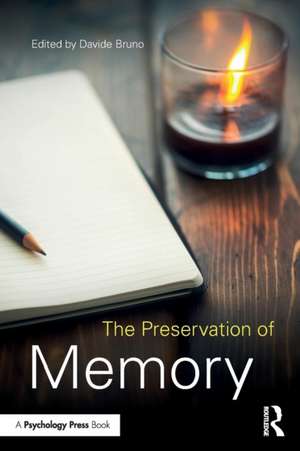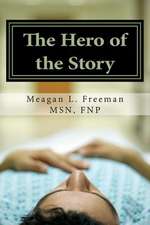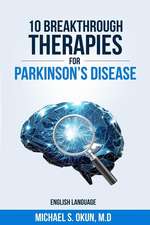The Preservation of Memory
Editat de Davide Brunoen Limba Engleză Paperback – 8 dec 2015
The chapters in this volume describe and evaluate both well-established and novel methods for improving and strengthening memory, for people with and without dementia. They also look at ways in which effective detection and care can be implemented, and describe empirical findings that can be translated into everyday practice. The contributors take a multidisciplinary approach, motivated by the desire to look beyond and across boundaries to find new areas of knowledge and new opportunities.
The Preservation of Memory will be useful reading for students and researchers focusing upon memory, aging and dementia, and also for mental health practitioners, social workers, and carers of persons living with dementia or other memory impairments.
| Toate formatele și edițiile | Preț | Express |
|---|---|---|
| Paperback (1) | 413.37 lei 6-8 săpt. | |
| Taylor & Francis – 8 dec 2015 | 413.37 lei 6-8 săpt. | |
| Hardback (1) | 1000.30 lei 6-8 săpt. | |
| Taylor & Francis – 15 dec 2015 | 1000.30 lei 6-8 săpt. |
Preț: 413.37 lei
Nou
Puncte Express: 620
Preț estimativ în valută:
79.10€ • 82.81$ • 65.45£
79.10€ • 82.81$ • 65.45£
Carte tipărită la comandă
Livrare economică 05-19 aprilie
Preluare comenzi: 021 569.72.76
Specificații
ISBN-13: 9781138840195
ISBN-10: 113884019X
Pagini: 246
Ilustrații: 22 black & white illustrations, 6 black & white tables, 5 black & white halftones, 17 black & white line drawings
Dimensiuni: 156 x 234 x 15 mm
Greutate: 0.39 kg
Ediția:1
Editura: Taylor & Francis
Colecția Psychology Press
Locul publicării:Oxford, United Kingdom
ISBN-10: 113884019X
Pagini: 246
Ilustrații: 22 black & white illustrations, 6 black & white tables, 5 black & white halftones, 17 black & white line drawings
Dimensiuni: 156 x 234 x 15 mm
Greutate: 0.39 kg
Ediția:1
Editura: Taylor & Francis
Colecția Psychology Press
Locul publicării:Oxford, United Kingdom
Public țintă
PostgraduateCuprins
Part 1: Introduction to remembering: The basics of memory 1. The effects of normal and pathological ageing on memory, Andrew Rutherford and Davide Bruno 2. The aging hippocampus: a cross-species examination, Stephanie Leal and Michael Yassa 3. Recognition Memory, Tina Chen, Caren M. Rotello and Paul Verhaeghen 4. Remembering the source: Directions for intervention in ageing, Noeleen M. Brady and Richard A. P. Roche Part 2: Assessment and prediction 5. From Click to Cognition: Detecting cognitive decline through daily computer use, Gemma Stringer, Peter Sawyer, Alistair Sutcliffe and Iracema Leroi 6. The Memory Education and Research Initiative: A Model for Community Based Clinical Research, Chelsea Reichert, John J. Sidtis and Nunzio Pomara Part 3: From the laboratory to the home: Practical applications for ageing populations 7. Using the background to remember the foreground: The role of contextual information in memory, Gerasimos Markopoulos 8. Can Survival Processing Help to Preserve our Memories? Daniel P. A. Clark 9.The effects of ageing and exercise on recollection and familiarity based memory processes, Richard J. Tunney, Harriet A. Allen, Charlotte Bonardi and Holly Blake 10. Memory Training for Older Adults: A Review with Recommendations for Clinicians, Robin L. West and Carla M. Strickland-Hughes Part 4: Facing the Memory Challenge in Dementia 11. Keeping Memories Alive: Creativity in Dementia care, alternatives to Pharmacotherapy, Niamh Malone and Donna Redgrave 12. Remembering to remember – the living lab approach to meeting the everyday challenges of people living with dementia, Grahame Smith 13. Cognitive approaches to enabling people to live well with dementia, Sarah Jane Smith and Jan R. Oyebode 14. Augmenting familiar appliances to assist people living with dementia, Damien Renner, David Reid, Mark Barrett-Baxendale, Davide Bruno and Hissam Tawfik
Recenzii
I thoroughly enjoyed The Preservation of Memory. The central question of how we can preserve memory function as we age and/or develop cognitive impairment is one of central importance to a range of researchers, clinicians, and individuals. The broad coverage of a range of topics provides a unique multi-faceted perspective, making the book relevant and accessible to a wide-ranging readership. - Stefan Teipel, Department of Psychosomatic Medicine, University of Rostock, and DZNE Rostock, Germany
"The Preservation of Memory provides a useful overview of research literature (both theory and practice) on aging and cognitive impairment. The volume reflects a distinct multidisciplinarity with contributions from scholars of cognitive psychology, aging, neuroscience, and cognitive neuroscience." - G. C. Gamst, University of La Verne, CHOICE
I thoroughly enjoyed The Preservation of Memory. The central question of how we can preserve memory function as we age and/or develop cognitive impairment is one of central importance to a range of researchers, clinicians, and individuals. The broad coverage of a range of topics provides a unique multi-faceted perspective, making the book relevant and accessible to a wide-ranging readership. - Stefan Teipel, Department of Psychosomatic Medicine, University of Rostock, and DZNE Rostock, Germany
"The Preservation of Memory provides a useful overview of research literature (both theory and practice) on aging and cognitive impairment. The volume reflects a distinct multidisciplinarity with contributions from scholars of cognitive psychology, aging, neuroscience, and cognitive neuroscience." - G. C. Gamst, University of La Verne, CHOICE
I thoroughly enjoyed The Preservation of Memory. The central question of how we can preserve memory function as we age and/or develop cognitive impairment is one of central importance to a range of researchers, clinicians, and individuals. The broad coverage of a range of topics provides a unique multi-faceted perspective, making the book relevant and accessible to a wide-ranging readership. - Stefan Teipel, Department of Psychosomatic Medicine, University of Rostock, and DZNE Rostock, Germany
Descriere
The Preservation of Memory explores non-invasive, empirically-sound strategies which ensure long-lasting and effective retention of information for individuals which are coping with the effects of age-related memory loss. It will be essential reading for students and researchers focusing upon memory, aging and dementia, and also clinical practitioners working in this area.





























